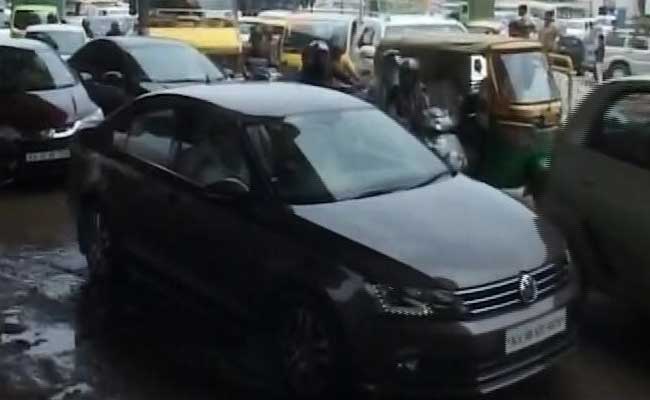
Bengaluru's flooding issue during monsoons is mostly due to poor planning.
- This year, Bengaluru so far has witnessed a week's rainfall
- The city is now facing water-logging and chaotic traffic congestions
- The city's flooding issue is mostly due to poor planning
Did our AI summary help?
Let us know.
Bengaluru:
Monsoons arrived early this year in Bengaluru, shortening the summer by at least two weeks. A week's rainfall and the city is already drowning under heavy downpour.
Last July, incessant overnight rains had turned Bengaluru roads into river with locals fishing on a normally busy Ring Road.
This year, the city so far has witnessed a weeks' rainfall.
With it, Bengaluru saw trees, brought down by rainfall, landing on vehicles and blocking roads. Low-level streets faced water-logging leading to chaotic traffic congestions.
Bengaluru's flooding issue during monsoons is mostly due to poor planning.
Over the past few years, commercial and residential buildings have mushroomed next to lake beds. During rains, the lakes' water level goes up, leading to flooding of streets and houses.
After last year's floods, city authorities launched a massive demolition drive to remove buildings that encroached beside lake beds. The move was resisted by home builders and owners, many of whom did not know they had built on encroached land. Yet, the demolition went on, clearing lake beds and blocked storm water drains. The dumping of garbage on drains also makes matters worse.
Umashankara Sharma, a local resident, says the area near Manpho convention centre was flooded after a builder encroached on nearby storm water drain.
"There is a dire need to stop these unlawful activities of builders who haven't considered the plight of persons involved or affected by his actions," he said.

However, not all the buildings on lake beds are illegal. Some were built by the government earlier, such as the city bus stand on a lake bed and the National Games Village on another.
This year, city authorities tried to prepare for monsoons. They desilted storm water drains. Manjunath Prasad, the Bruhat Bengaluru Mahanagara Palike or BBMP Commissioner, cancelled all leaves of officers and announced that 72 emergency rooms would be set up across the city with relief equipment.
On May 20, while working on clearing a storm drain, contractor Shantha Kumar was washed away.
Today, India's IT capital finds itself at the mercy of rains. It is a city that has grown too fast and without the planning that was required.
Last July, incessant overnight rains had turned Bengaluru roads into river with locals fishing on a normally busy Ring Road.
This year, the city so far has witnessed a weeks' rainfall.
With it, Bengaluru saw trees, brought down by rainfall, landing on vehicles and blocking roads. Low-level streets faced water-logging leading to chaotic traffic congestions.
Bengaluru's flooding issue during monsoons is mostly due to poor planning.
Over the past few years, commercial and residential buildings have mushroomed next to lake beds. During rains, the lakes' water level goes up, leading to flooding of streets and houses.
After last year's floods, city authorities launched a massive demolition drive to remove buildings that encroached beside lake beds. The move was resisted by home builders and owners, many of whom did not know they had built on encroached land. Yet, the demolition went on, clearing lake beds and blocked storm water drains. The dumping of garbage on drains also makes matters worse.
Umashankara Sharma, a local resident, says the area near Manpho convention centre was flooded after a builder encroached on nearby storm water drain.
"There is a dire need to stop these unlawful activities of builders who haven't considered the plight of persons involved or affected by his actions," he said.

Monsoons arrived early this year in Bengaluru, shortening the summer by at least two weeks
However, not all the buildings on lake beds are illegal. Some were built by the government earlier, such as the city bus stand on a lake bed and the National Games Village on another.
This year, city authorities tried to prepare for monsoons. They desilted storm water drains. Manjunath Prasad, the Bruhat Bengaluru Mahanagara Palike or BBMP Commissioner, cancelled all leaves of officers and announced that 72 emergency rooms would be set up across the city with relief equipment.
On May 20, while working on clearing a storm drain, contractor Shantha Kumar was washed away.
Today, India's IT capital finds itself at the mercy of rains. It is a city that has grown too fast and without the planning that was required.
Track Latest News Live on NDTV.com and get news updates from India and around the world

